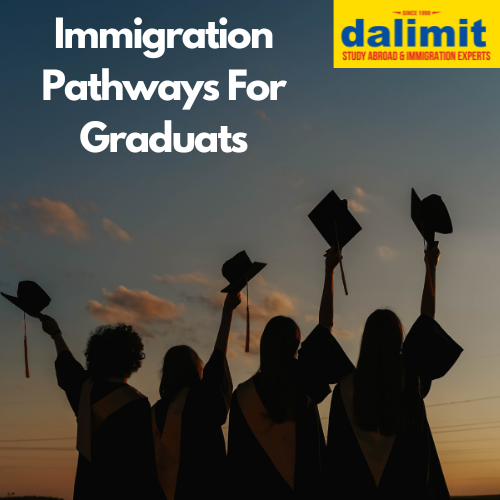
Here are some specific immigration pathways that graduates may consider in various countries
- Post-Graduation Work Permits: Many countries offer post-graduation work permits that allow international students to stay and work temporarily after completing their studies. This period can provide graduates with valuable work experience and sometimes serves as a pathway to permanent residency or citizenship.
- Skilled Worker Programs: Some countries have skilled worker immigration programs that prioritize individuals with advanced degrees or specific skills. Graduates with in-demand qualifications may qualify for these programs, which often lead to permanent residency.
- Entrepreneurship Visas: Several countries encourage graduates to start businesses through entrepreneurship visas. These programs typically require applicants to demonstrate a viable business plan and commit to creating jobs or contributing to the local economy.
- Family Sponsorship: Graduates who have immediate family members (such as parents or siblings) who are citizens or permanent residents of a country may be eligible for family sponsorship, which can lead to permanent residency.
- Express Entry Systems: Some countries, like Canada, use an Express Entry system to manage skilled worker immigration. Graduates may qualify based on their education, language proficiency, work experience, and other factors, and can apply for permanent residency through this system.
- Global Talent Stream: Certain countries have initiatives aimed at attracting global talent, including recent graduates in specific fields. These programs often simplify immigration processes and provide expedited pathways to residency or citizenship.
- Research and Academic Pathways: Graduates pursuing careers in research or academia may have opportunities to immigrate through programs designed to attract researchers, professors, and other professionals in these fields.
- Regional or State Nomination Programs: In countries like Australia, regional or state nomination programs allow graduates to apply for state or regional sponsorship, which can enhance their chances of obtaining permanent residency.
- Graduate Route: The UK, for example, offers a Graduate Route visa for international students who have completed a degree in the UK. This visa allows them to stay and work or seek employment opportunities for up to two years (or three years for doctoral graduates).
- Exchange Programs and Bilateral Agreements: Some countries have exchange programs or bilateral agreements that facilitate mobility and provide streamlined immigration pathways for graduates from specific countries.
It’s essential for graduates to research immigration pathways. It’s essential for graduates to research immigration pathways. Moreover, understanding eligibility requirements and application processes is crucial. In addition, consulting experts can offer valuable, personalized guidance. As a result, graduates are better equipped to make informed decisions. Furthermore, timely preparation can prevent potential challenges. Additionally, exploring various options ensures that the best pathway is chosen. Ultimately, strategic planning enhances the likelihood of a successful immigration journey. Ultimately, strategic planning leads to greater success
Here are examples of countries that offer various immigration pathways for graduates:
- Canada:
- Post-Graduation Work Permit: Allows graduates to work in Canada temporarily after completing their studies.
- Express Entry: Points-based system for skilled workers, which includes points for education, work experience, language proficiency, etc.
- Provincial Nominee Programs : Many provinces have PNPs that nominate individuals with specific skills or ties to the province for permanent residency.
- Australia:
- Temporary Graduate Visa : Allows international students to live, study, and work in Australia temporarily after completing their studies.
- Skilled Independent Visa : Points-based visa for skilled workers who are not sponsored by an employer, state, or family member.
- Regional Skilled Visas: Various visas that provide pathways to permanent residency for graduates who work in regional areas.
- United States:
- Optional Practical Training : Allows international students to work in the U.S. for up to 12 months after completing their studies.
- H-1B Visa: For specialty occupations requiring theoretical or technical expertise.
- EB-2 and EB-3 Visas: Employment-based immigrant visas that may be available to graduates depending on their qualifications and job offers.
- United Kingdom:
- Graduate Route: Allows international students who have completed a degree in the UK to stay and work or seek employment opportunities for up to two years (or three years for doctoral graduates).
- Skilled Worker Visa : Points-based visa for skilled workers with a job offer from a UK employer.
- Germany:
- Job Seeker Visa: Allows graduates to stay in Germany for up to six months to search for employment related to their qualification.
- EU Blue Card: Allows highly skilled non-EU citizens to work and stay in Germany, with easier pathways to permanent residency.
- New Zealand:
- Post-Study Work Visa: Allows graduates to work in New Zealand for up to three years, depending on the level of their qualification and the location of their study.
- Skilled Migrant Category: Points-based system for skilled workers applying for residency.
- Singapore:
- Post-Graduate Work Permit: Allows international graduates from recognized institutions in Singapore to work for up to one year.
- Employment Pass: For foreign professionals, managers, executives, and technicians with a job offer in Singapore.
However, immigration policies are subject to change and may differ across countries. Therefore, graduates must stay informed about the latest updates, carefully research available pathways, and consult immigration professionals who can offer tailored guidance based on their unique circumstances and goals.
There are several benefits for graduates who utilize immigration pathways after completing their studies abroad. Here are some key advantages:
Career Opportunities: Immigration pathways often include provisions for graduates to work in their host country after completing their studies. This allows them to gain valuable work experience in a global environment, potentially in their field of study or in industries where there is demand for their skills.
Professional Development: Working in a new country can enhance professional skills such as adaptability, cross-cultural communication, and international business acumen. This experience is highly valued by employers and can accelerate career advancement.
Access to Better Job Markets: Some countries offer immigration pathways that prioritize graduates with skills that are in demand locally. Opening up access to job markets with better employment prospects and opportunities for career growth.
Pathway to Permanent Residency and Citizenship: Many immigration pathways for graduates are designed as stepping stones to permanent residency or citizenship in the host country. This provides long-term security and stability, along with access to social benefits and rights enjoyed by permanent residents.
Cultural and Personal Growth: Living and working in a new country exposes graduates to different cultures, languages, and ways of life. This immersion fosters personal growth, broadens perspectives, and builds a global network of contacts and friendships.
Access to Social Services and Benefits: Permanent residents and citizens typically have access to social services such as healthcare, education. Social welfare programs provided by the host country, which can contribute to a higher quality of life.
Family Reunification: Some immigration pathways allow graduates to sponsor family members to join them in the host country. Facilitating reunification with loved ones and creating a supportive environment for personal and professional success.
Contribution to the Host Country’s Economy and Society: Immigrant graduates often contribute positively to the host country’s economy through their skills, entrepreneurship, and innovation. They also enrich the cultural fabric of society, promoting diversity and tolerance.
Global Mobility: With permanent residency or citizenship, graduates have greater flexibility and opportunities for international travel and mobility, including easier access to visas for other countries and regions.
Education and Research Opportunities: Some countries offer pathways for graduates pursuing further education or research. Which can lead to advanced degrees, specialized skills, and enhanced career opportunities in academia or industry.
Determining eligibility for immigration pathways for graduates typically involves several factors that vary depending on the country and specific program. Here are some common criteria that may determine eligibility:
Completion of Studies: Generally, eligibility requires the completion of a degree, diploma, or certificate from a recognized educational institution in the host country or abroad. Programs may specify minimum educational requirements, such as undergraduate, graduate, or postgraduate degrees.
Type of Institution: Some immigration pathways may require graduates to have studied at a recognized university, college, or institution that meets specific accreditation standards.
Duration of Study: Immigration programs often stipulate a minimum duration of study, such as completing a program of study that lasted for a specified period. (e.g., two years for post-graduate work permits in some countries).
Academic Achievement: Certain programs may require graduates to demonstrate academic achievement, such as achieving a certain GPA or being in good academic standing.
Language Proficiency: Proficiency in the official language(s) of the host country is often required. This may be demonstrated through language tests such as IELTS, TOEFL, or others, depending on the country’s requirements.
Job Offer or Employment: Some immigration pathways, such as skilled worker programs or employer-sponsored visas. May require graduates to have a job offer from a local employer in a relevant field of study. Alternatively, graduates may need to secure employment that meets specific criteria related to skill shortages or labor market needs.
Financial Stability: Proof of financial stability, such as bank statements or sponsorship, may be required to demonstrate. The ability to support oneself and any accompanying family members during the initial period of stay.
Health and Character Requirements: Applicants may need to undergo medical examinations to ensure they meet health requirements . Provide police clearance certificates or other documents to demonstrate good character.
Age and Other Demographic Factors: Some programs may have age restrictions or other demographic considerations. Such as requirements for young professionals or specific categories of workers.
Specific Program Requirements: Each immigration program may have additional specific requirements or criteria that applicants must meet. Such as experience in certain occupations, investments, or other qualifications relevant to the program’s objectives.
conclusion
In conclusion, immigration pathways for graduates offer valuable opportunities for individuals looking to enhance their careers and lifestyles abroad. These pathways provide numerous benefits, including access to job markets, professional development. Pathways to permanent residency and citizenship, cultural enrichment, and contributions to the host country’s economy and society. Eligibility criteria typically include completing studies at recognized institutions. Meeting language proficiency requirements, securing job offers or employment, and fulfilling health and character requirements. Understanding these criteria and seeking guidance as needed can help graduates navigate the process effectively. Overall, these immigration pathways support personal growth, career advancement, and the pursuit of a fulfilling life in a new country.
However, if you have questions or need assistance,contact +91 9825106789 feel free to ask here! I’m here to help with information and guidance on a wide range of topics.
